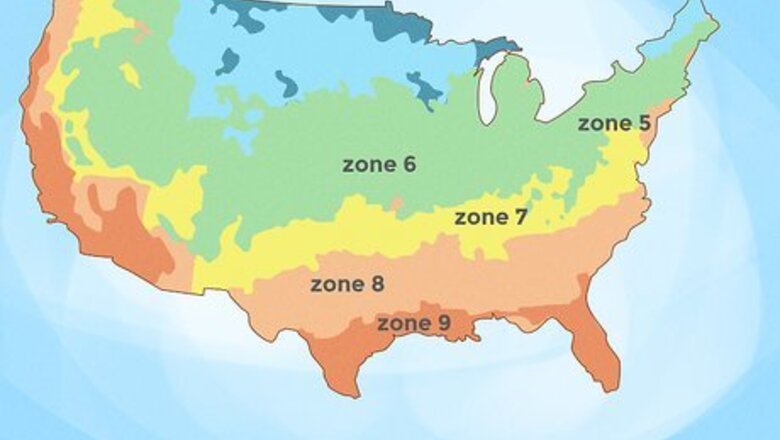
views
Choosing Your Roses
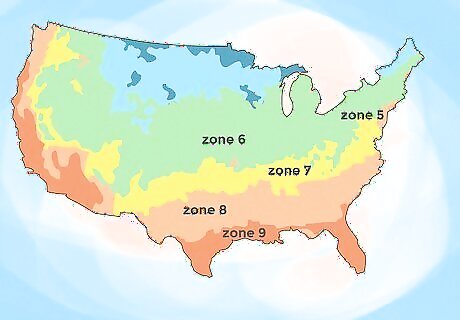
Grow roses if you live in climate zones 5-9. Search for “climate zone” online and select a website offering a grow zone calculator. Type in your zip code, and the grow zone calculator will give you a number and/or a letter, like "6b." Long stem roses grow best in climate zones 5-9. If you don’t live in this climate zone, your roses may not grow to full size.

Choose a type of rose known to grow long stems. When it comes to growing long stem roses, Hybrid Tea Roses are most commonly grown. These roses are a popular choice because of their long stems and iconic bud shape. They come in a wide range of colors, including red, pink, orange, purple, green, white, and yellow. Select a long rose variety in a color of your choice. In addition, Ingrid Bergman, Opening Night, and Firefighter roses are also popular long stem varieties.
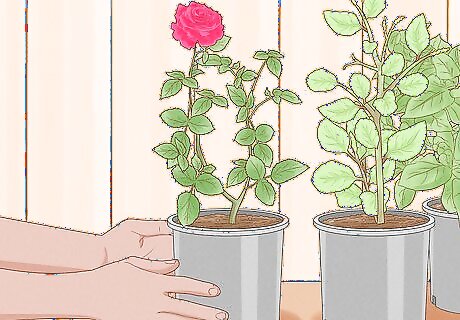
Purchase your roses as small plants from a local nursery. Most commonly, roses from a nursery are grown in containers, and you can purchase them as small plants. Roses grow in bushes, and you can either replant them in your garden or into another large, deep container. To find your roses, search online for a local nursery, and browse their selection of long stem species. Hybrid Tea Roses have countless individual species, and there are also other varieties of long stem roses you can choose from. You can select your rose species based on things like their color, maximum height, fragrance, or number of petals, for example. You can also purchase roses from online nurseries. If you want to do this, reserve your roses in January or February so they are ready for the springtime. deep in your top-soil. Insert the cutting and tap the soil around it. Keep the soil moist as you wait for the cutting to take root, which may take up to 8 weeks.”|}}
Deciding Where to Plant
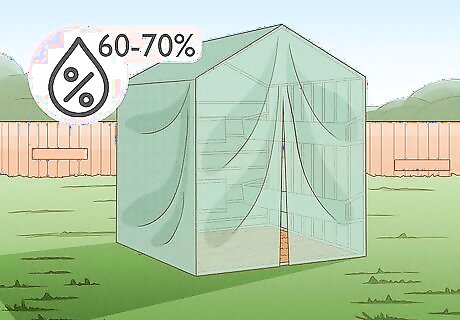
Install a greenhouse to control the growing climate if you have space. Roses prefer to grow in full sunlight, so they can grow large, full buds. To provide them the best growing conditions, you can place them inside a greenhouse. If you have room and funds to set up greenhouse, you can purchase a greenhouse kit from most home supply stores and nurseries, or you can easily build your own out of PVC pipes and plastic coverings. After you have your greenhouse, you can simply set your potted rose bushes inside. Roses prefer to grow at about 80 °F (27 °C) and at a 60-70% humidity level.
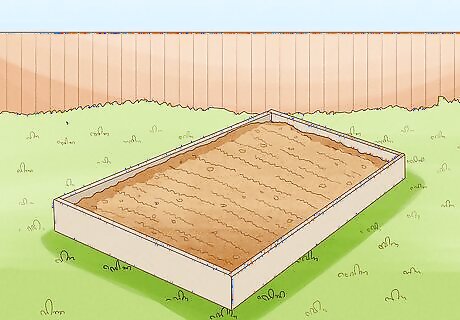
Grow your roses in your garden if you cannot use a greenhouse. If you aren’t able to build a greenhouse, that’s okay! You can plant your rose bushes in your garden beds or raised beds. Alternatively, you can leave your roses in their containers and place them outside.
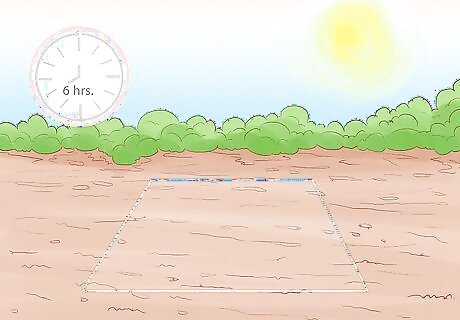
Pick a spot where your roses receive full sun for at least 6 hours a day. Roses want as much sunshine as they can get! Find a spot in your garden that gets ample sun coverage. At a minimum, your roses should get direct sun for at least 6 hours. Pick out a spot either for your greenhouse or in your garden bed. Roses without adequate sunlight will grow less than ideal flowers. If your roses do not get enough sunlight, they may develop fungal diseases resulting in black spots on their petals and leaves. Some varieties of roses can handle more sun than others. Read the packet on your rose seeds for more specific information about the needs of your specific rose.
Planting Your Roses
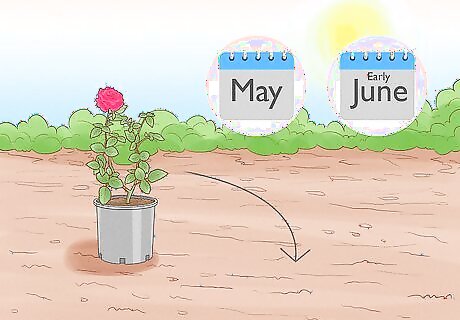
Plant your roses by May or early June, based on their instructions. Before you plant your roses, check the instructions of your particular rose type to determine when to plant them outside. Typically, the best time to grow roses is throughout the month of May. At the absolute latest, you should plant your roses in early June for best results.
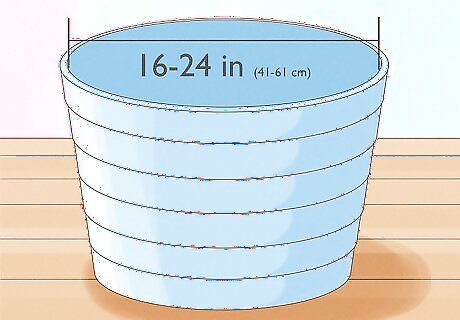
Purchase a pot 16–24 in (41–61 cm) wide if planting roses in a container. If you want to transplant your roses to a different container, make sure your pot has a diameter of at least 16 in (41 cm) so it can house your roses as they grow. If you have a larger rose bush, go with a larger pot so the roots have adequate room to take into the soil. You can purchase large pots at most home supply and garden stores.
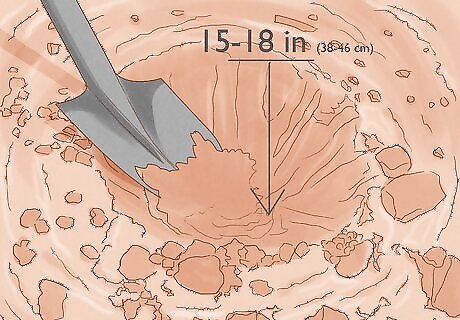
Dig a hole 15–18 in (38–46 cm) wide if planting roses in your garden. When transplanting roses, it is helpful to dig a wide hole so you can easily place the roots in the soil. Line the tip of your shovel up to your soil, and press on the side of your shovel with your foot with moderate force. This gets the shovel deep into the soil so you can scoop out a lot of dirt. Dig away your soil until your hole is roughly 15–18 in (38–46 cm) wide. This does not have to be an exact measurement. You can eyeball the size of your hole, based off of the size of your rose bush. For instance, if you have a smaller bush, dig your hole slightly smaller.
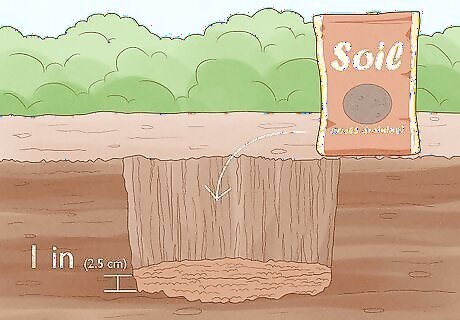
Fill the bottom with 1 in (2.5 cm) of well-drained soil made for roses. Whether you are putting them in the dirt or transplanting them to another container, always use well-drained soil with your roses. Use a garden tool to scoop out some soil, and line the base of your hole. You can purchase potting soil for roses at home supply and garden stores. If your soil does not drain properly, your roses may develop fungal diseases.
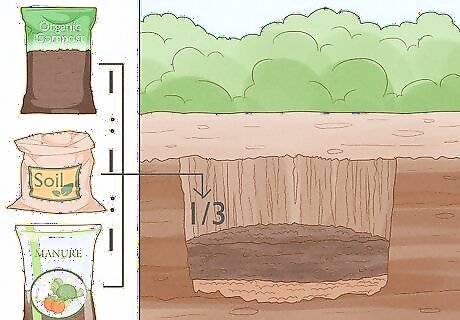
Mix equal parts of soil, compost, and manure and fill the hole or pot. Find a bucket, and fill it up ⅓ of the way with your potting soil. Then, fill another ⅓ with compost (either store bought or from your compost bin). Fill your bucket the last ⅓ of the way full with bagged manure. Then, mix it all together with your garden tool. Use this mixture to fill the rest of your hole. Add soil until either your hole or container is full to the top.
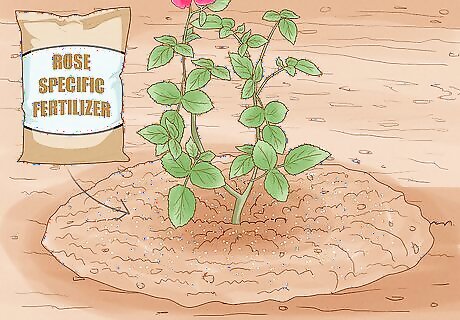
Use fertilizer specific for roses and follow the directions carefully. Purchase a fertilizer formulated specifically for roses from a nursery or garden center. Read the directions carefully to use your fertilizer. Generally, you can sprinkle it over top of your top soil before you water your plants. In addition, you can purchase liquid fertilizer and mix it with your water.
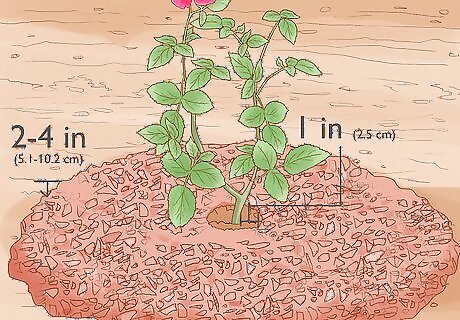
Cover your topsoil in a 2–4 in (5.1–10.2 cm) layer of mulch. Mulch helps reduce stress on the plant, conserve water, and encourage healthy growth. Scoop mulch with your garden tool or shovel and place it on top of your soil. Continue spreading mulch until you have at least a 2 in (5.1 cm) layer. Leave about 1 in (2.5 cm) between the base of the stem and the mulch. If you planted your roses in containers, adding mulch is optional. It helps them grow, but you may not have room in your pot for 2 in (5.1 cm). Some is better than none!
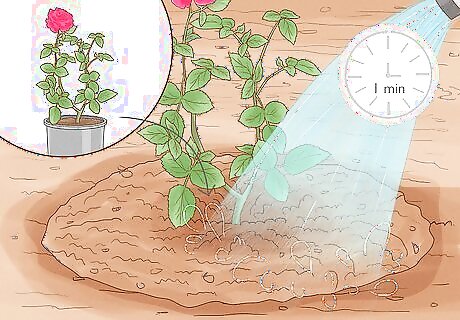
Water your roses thoroughly immediately after you plant them. Grab your gardening hose, and place it at the base of your rose bush. Water your roses for about a minute so they are thoroughly saturated. Watering your flowers right after you plant them helps the roots take to the new soil.
Caring for Your Roses
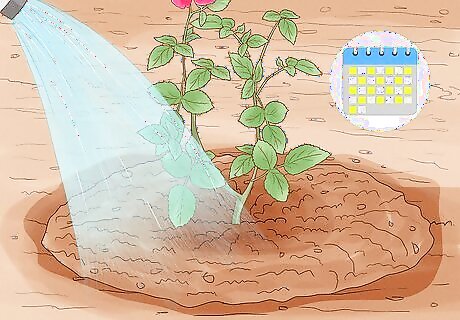
Water your roses diligently at least every 2 days. Roses require ample water to grow large, gorgeous flowers. Soak all of the roots about 1 minute at least 2 times a week in warm weather. You want to take your time watering the roses so the water reaches entirely to the roots, rather than just the surface. To check how wet your soil is, simply stick your finger all the way into the soil. If it is dry, you should water your roses. Generally, aim to give the roses a total of 3 in (7.6 cm) of water every week.
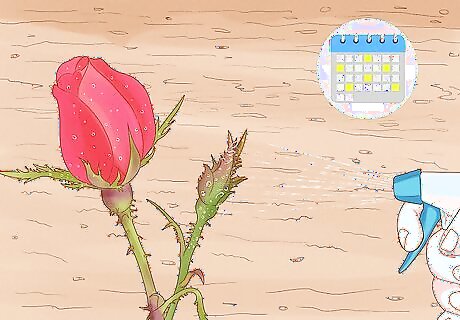
Mist the buds with a light coating of water every 2-4 days. In addition to regular watering, you can spray your rose blooms with a squirt bottle once your flowers emerge. This helps keep them clean and moisturize the petals.
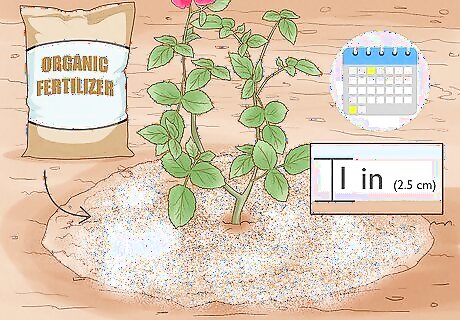
Apply a fresh layer of organic fertilizer once every 4 weeks. Roses use nutrients in the soil very quickly as they grow their flowers. In particular, their primary nutrients include nitrogen, phosphorus, and potassium. To keep them well fed, spread a 1 in (2.5 cm) layer of fertilizer over their topsoil about once a month. You can purchase fertilizer at garden centers and home supply stores. Alternatively, you can use compost to feed your roses.

Trim your roses regularly to remove leaves, stems, and additional buds. When growing long stem roses, you want each plant to grow 1 large, luscious flower. Once your roses grow to about 18–24 in (46–61 cm), trim away any extra leaves and shoots from the main base stem using garden shears. In addition, go around the stem and look for any small green buds. When you find the buds, snip them off at the stem using your shears. Removing the additional leaves, stems, and buds helps the plant direct all its nutrients to the main bud.
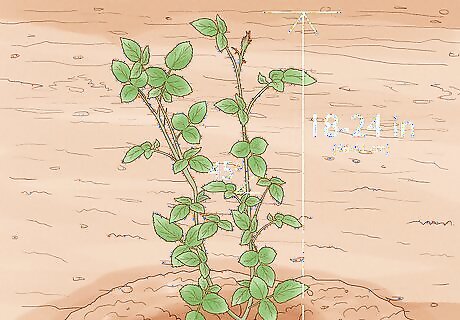
Cut your roses when they reach 18–24 in (46–61 cm). If you want to cut your long stem flowers to display in a bouquet or a vase, trim your roses when they grow to about 18 in (46 cm) or longer. This is the length of your standard long stem rose. Trim off the extra leaves and buds with garden shears, then cut the rose about 18 in (46 cm) away from the flower. Make your cut at a 45-degree angle directly above another bud to effectively prune the flower. If you want extra-long stems, let your rose continue to grow beyond 24 in (61 cm)



















Comments
0 comment